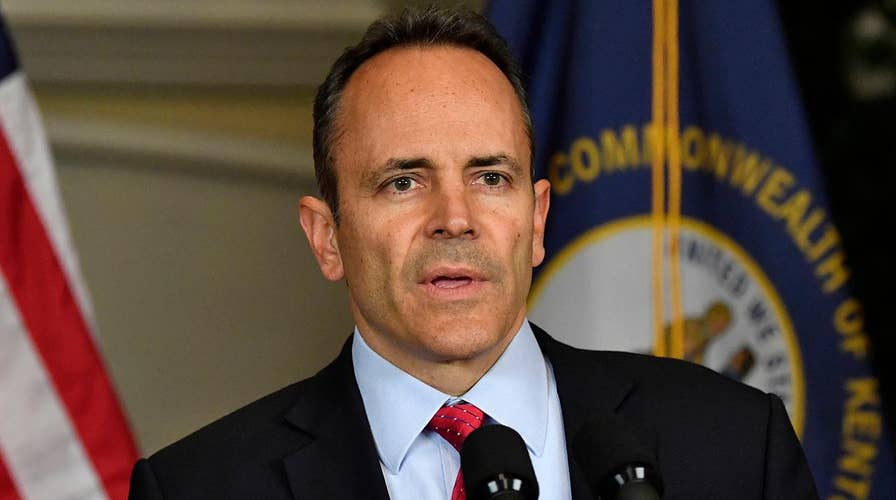Kentucky Governor Bevin calls for a recount in close election
Former DNC Chair Donna Brazile weighs in on the Kentucky gubernatorial election, some 2020 Democrats' 'Medicare-for-all' policies and Tulsi Gabbard's testy exchange on 'The View.'
With the 2020 presidential election less than a year away, America’s voter registration rolls are woefully out of shape. Yet well-funded liberal organizations are working to stop states from cleaning up their rolls. Their latest victim is Indiana. A federal district court has temporarily halted the state’s effort to compare its voter rolls with those of other states to eliminate duplicate registrations.
A three-judge panel of the Seventh Circuit Court of Appeals went to extraordinary lengths to come up with excuses for why a voter might need to be registered in more than one state. For example, “someone might move to Kansas from Indiana to take a new job, and upon arrival in Kansas immediately register to vote in Kansas. But if her personal circumstances change before Election Day – she flunks a probationary period on the job, a family member becomes sick, a better opportunity arises in Indiana – the person might decide to return to her former residence in Indiana.”
But don’t worry, said Judge Diane Wood, the Clinton appointee who wrote the opinion. Those voters who are registered in more than one state “will vote in only one place, even if they have open registrations in two.” Really?
ADRIANA COHEN: A DEMOCRATIC PRESIDENT WOULD MAKE BIG CHANGES IN YOUR LIFE – FOR THE WORSE
The Heritage Foundation’s election fraud database lists many cases of duplicate voting. Some are rather pedestrian, such as John Marotta, who was convicted in 2011 of casting ballots in both Arizona and Colorado. Others, like that of Wendy Rosen, are a bit more colorful. A Democratic congressional candidate in Maryland, Rosen was forced out of the 2012 race (and later pled guilty to voter fraud) after it was discovered that she had illegally voted in both Maryland and Florida in multiple elections.
More from Opinion
Or how about the very ambitious Pasco Parker, who was convicted in 2015 of illegally voting in Tennessee, Florida and North Carolina in the 2012 federal election. He obviously wanted to make sure he cast as many votes as possible for his favored presidential candidate
The Government Accountability Institute (GAI) studied voter rolls in 21 states following the 2016 election. It found almost 8,500 individuals who appeared to have voted illegally in multiple states in that election. “Extending GAI’s conservative matching method to include all 50 states,” the report noted, “would indicate an expected minimum of 45,000 high-confidence duplicate voting matches.”
Duplicate registrations create a fertile ground for double voting – which is impossible to detect when a court limits what a state can do with evidence of duplicate registrations.
If you recently moved and forgot to notify the state where you used to live to cancel your voter registration, you are not alone. A 2012 report by the Pew Research Center found that “[a]pproximately 2.75 million people have registrations in more than one state.” Justice Samuel Alito last year referenced the same study in the Supreme Court’s opinion upholding Ohio’s voter list maintenance procedures: “It has been estimated that 24 million voter registrations in the United States — about one in eight — are either invalid or significantly inaccurate.”
Such registration errors, even when unintentional, are not harmless. They translate to more work for already hard-pressed elections officials and taxpayer money wasted on unnecessary election-related mailings. Duplicate registrations can translate into longer waits at polling locations as elections officials rifle through bloated lists of registrants.
Duplicate registrations also create a fertile ground for double voting – which is impossible to detect when a court limits what a state can do with evidence of duplicate registrations.
CLICK HERE TO GET THE OPINION NEWSLETTER
To address this serious problem, Indiana participates in the Interstate Crosscheck Program, whose member states compare voter rolls to find people registered in multiple states. In 2017 and 2018, Indiana passed legislation allowing the cancellation of registrations when the state confirmed through a series of factors that the same person was registered in more than one state.
Before the legislation was even implemented, Common Cause, the NAACP, and the League of Women Voters — organizations that have consistently opposed any efforts to improve election integrity — sued to shut down the program.
The Constitution gives states the primary responsibility of conducting elections subject to certain limited powers of the federal government. In 1993, Congress passed the National Voter Registration Act to establish guidelines for voter registration and list maintenance.
CLICK HERE TO GET THE FOX NEWS APP
Unfortunately, leftist organizations have used this law to curtail efforts to improve the accuracy of voter lists. In Indiana, they succeeded in getting the court to misinterpret the plain language of the act. The court held that registering to vote in another state – despite the fact that you are declaring in writing that you are now a resident of that state and thus eligible to vote there – does not equate to a written confirmation that the registrant has moved.
As we enter 2020, we can expect to see more attacks on election integrity from the usual suspects. As the attacks pile higher and courts issue misguided opinions, confidence in our elections erodes further. It is time to support states that seek to improve the security of their election process.
CLICK HERE TO READ MORE BY HANS VON SPAKOVSY
Kaylan Phillips serves as litigation counsel for the Public Interest Legal Foundation, a 501(c)(3) public interest law firm dedicated to election integrity.

